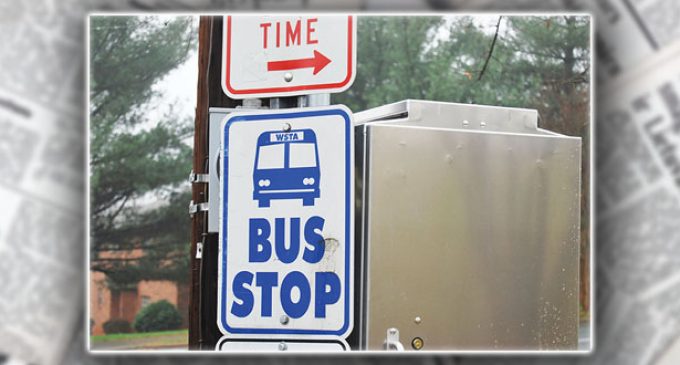City Council OKs historic bus route overhaul for 2017

Photo by Todd Luck
One of the many Winston-Salem Transit Authority bus stops throughout the city. WSTA will be changing its bus routes in 2017.
By Todd Luck
The Chronicle
Winston-Salem City Council approved the biggest overhaul of bus routes in Winston-Salem Transit Authority history during its meeting on Monday, Dec. 21.
The new routes will be implemented January 2, 2017. The WSTA will spend the next year preparing for the new routes by reprograming its computer systems, moving bus stops, and training employees. It will also be implementing a massive campaign to inform riders about the changes.
“This is an important undertaking,” said City Council Member Dan Besse, who heads the Public Works Committee. “We’ve had a bus system in Winston-Salem run by the city of Winston-Salem for decades. It has never been systematically reviewed and revamped until now.”
The Public Works Committee and City Council directed WSTA to review their routes and found that the incremental changes made to the routes, some of which are decades old, had made them inefficient and didn’t provide the best service possible, particularly when it came to how long it took riders to get where they needed to go. The 28 new routes are designed to shorten ride times and provide more service to popular destinations with crosstown routes and circulator routes. Riders will no longer have to go to the bus station downtown to transfer for most routes, since there will be numerous transfer points throughout the city.
City council members said that it was important that rider feedback was incorporated into the new routes and they felt WSTA had been responsive to its riders.
“We have a bus system that has historically served people who have had no other choice in terms of transportation,” said City Council member Derwin Montgomery. “It is very important in the process that we take it into high consideration that this is a lifeline that links individuals to jobs, to access to shopping, to access to healthcare.”
WSTA initially used automatic passenger counter information and a survey of passenger’s origins and destinations to design new routes. Bus rider feedback on the new routes was gathered in May and June as the WSTA held more than 20 public comment meetings. Feedback also came from riders online and from City Council members who passed on their constituentys’ concerns about the changes to WSTA. Feedback resulted in changes to at least a dozen of the new routes, including the inclusion of places like Green Street United Methodist Church’s Shalom Project, Crystal Towers apartments and Industries for the Blind. New routes also came about from feedback, such as the circulator route for the Southeast Ward to fill in an area that was left unserved by the new routes.
The WSTA was initially instructed to create a cost neutral plan for new routes and make adjustments. The final plan ended up taking the annual cost of the bus system from $5.3 million to $5.8 million, which was too much for City Council Member Robert Clark, chair of the Finance Committee, and who was the one “no” vote on the new routes. Other city council members said they felt the additional cost was a good investment in a needed service.











